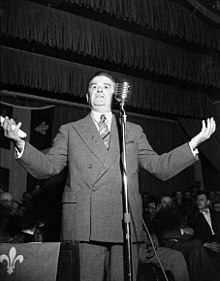Maurice Duplessis
Maurice Duplessis (born April 20, 1890 in Trois-Rivières , Canada ; † September 7, 1959 in Schefferville ) was Prime Minister of the Province of Québec from 1936 to 1939 and from 1944 to 1959.
Political biography
In 1935 Duplessis stood for the first time as a candidate for an alliance of the Action Liberale nationale and the conservative Parti Conservateur party . He narrowly lost to the liberal candidate Louis-Alexandre Taschereau . Duplessis transformed the alliance into a party, the Union nationale , which won the 1936 elections. In 1939 Adélard Godbout won the elections against Duplessis. But he came back to power in 1944.
He was considered an extreme autonomist who even rejected subsidies from the Canadian state. As a result, he found many followers, especially among the rural population. During his tenure, he supported private companies, most of which came from the USA . As the trade unions in Québec grew in importance in the 1940s (membership rose from 180,000 to 400,000), Duplessis sided with employers . In 1944 he initiated the law loi des relations ouvrières , which restricted the trade unions in their freedom of action.
Political stance
In his political convictions, Maurice Duplessis always presented himself as the savior of the "French-Canadian race", the French language and the traditions of Québec. In general, Duplessis was of the opinion that the state should interfere as little as possible in social and economic issues. He left the economy to the American multinationals.
Orphan scandal
During the Duplessis years, children born out of wedlock were often given by their economically weak parents to the care of orphanages , which were largely financed by the provincial government. There they were used as cheap labor for years, and some were also sexually abused. Many of them were declared insane and sent to mental hospitals. They were used as guinea pigs for drugs - sometimes with fatal results. These serious offenses are to be credited to Duplessis, at least indirectly.
successes
The rural population benefited from the electrical development of the country promoted by Duplessis, but a large part of the francophone workers lived below the subsistence level. Duplessis also subsidized the Gaspésie fishermen's associations ( Coopératives de pêcheurs en Gaspésie ).
During his tenure, the Roman Catholic Church reached the height of its influence; Catholic traditions and the Church played a very important role in Duplessis' politics. In 1948, Duplessis introduced the new flag of Québec, the Fleurdelisé .
literature
- Marcelle Maugin: Du référendum de 1980 au duplessisme , in Andrée Yanacopoulo Ed .: Au nom du père, du fils et de Duplessis. Editions du remue-ménage, Montréal 1984, pp. 115-134
Film documentaries
- A day with consequences: The betrayed orphans of Maurice Duplessis . French TV documentary by Marc Petitjean , Arte 2003, 52 minutes
swell
PHOENIX article: The betrayed orphans of Maurice Duplessis
Web links
- Biography on the Québec National Assembly website (French)
- Roncarelli v Duplessis ( English, French ) In: The Canadian Encyclopedia .
| personal data | |
|---|---|
| SURNAME | Duplessis, Maurice |
| BRIEF DESCRIPTION | Canadian politician |
| DATE OF BIRTH | April 20, 1890 |
| PLACE OF BIRTH | Trois-Rivières |
| DATE OF DEATH | 7th September 1959 |
| Place of death | Schefferville |


